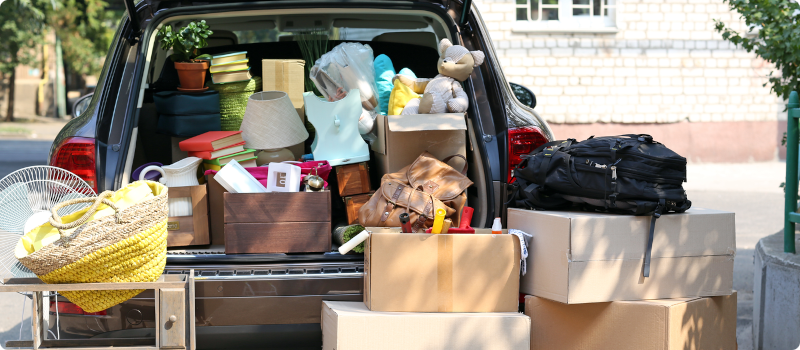How Does Home Insurance Cover Moving?
Updated May 13, 2024 . AmFam Team
Updated May 13, 2024 . AmFam Team
Have you recently found a new place to live? First off, congrats! If you’re going to be moving soon, you’ve probably found yourself pulled many different directions. In addition to preparing for the move, you’re probably working on closing on the new place and taking time off work — and to top it off, you may have upgrades at your new home to manage.
As the move-in date nears, all that initial excitement can fade quickly as the big job of relocating your personal possessions comes into focus. With all your worldly possessions traveling in a moving truck soon, do you know if they’re protected by the moving company?
Does home insurance cover your personal possessions in transit? The short answer: it depends on how and where the damage happened, and on the homeowners coverage you currently have.
To be sure you’re protected for the big move ahead, let’s look at how your homeowners policy covers your things when they’re in transit.
In most cases, your homeowners coverage will protect your personal possessions if they’re broken during a move, both on the way from and moving to an insured location. But exactly how your covered depends on the type of “covered peril” or loss that’s occurred. For instance, if you’ve neglected to properly protect your fine china before boxing it up, you may not be covered if breaks occurred in transit.
But if the moving truck carrying your personal property gets into an accident and your things are destroyed or damaged in that covered event, you’ll likely be able to file a claim.

Under a standard homeowners policy, most personal property in transit is covered on a named-peril basis only. That’s insurance jargon for a stated type of loss that is defined, or "named," in your homeowners policy. If the driver loses control of your moving truck and it overturns, causing real damage to much of your stuff on that truck, you’ll usually be covered.
That’s because your home insurance policy defined an overturned truck as a named peril. And that kind of coverage can mean a lot when everything you own is being transported across the country.
The great part about homeowners insurance is that it’s broad-spectrum coverage that can travel with your belongings. And in this case yes, it can be coverage that extends to things you move on your own.
If you move your things in your own trailer, those items are covered while in transit, but you’ll usually need to have comprehensive or collision coverage for your vehicle. And some insurance groups may require the trailer to be listed on the declarations page of your policy.
But you should know that the most common moving mishap — damage to personal items due to improper handling — is not usually covered. If you’re not a seasoned mover, you may think your things are safe for transport when they’re not. Without the right packing equipment and know-how, loads can shift during transport and that’s where breakage occurs that can result in a denied claim.
The answer to that depends on the state you’re in and your insurance carrier. It’s always best to call your insurance agent and inquire about how your auto coverage can extend to rental vehicles. You may want to purchase additional coverage from the truck rental company to ensure that the vehicle is sufficiently covered.

When getting quotes for moving, be sure to verify that your mover’s certificate of insurance is up to date. It’s also important to learn about the terms of their coverage. Ask them the following questions:
Moving companies may offer their own form of liability protection for breakage or damage to your possessions while they’re being transported. You should be aware: the protection typically offered by moving companies is not governed by state insurance laws.
Typically offered at no additional charge, this minimal coverage protects your things at around 60 cents per pound, per damaged item. So, if your eight-pound blender were damaged in transit, you’ll receive $4.80 ($0.60 x 8) for the loss. Frequently, that type of coverage won’t help you replace items broken in transit.
This more robust program is available for you to purchase separately and usually reimburses you for the full value of lost, damaged or destroyed items in your shipment.
Your moving company will likely attempt get broken items repaired, replace them with a similar product or offer a cash settlement based off of the current retail price for the items.
This coverage-for-purchase is usually paired with released value protection, where a third-party insurance company will cover the difference between 60 cents per-pound released value protection amount and the replacement price.

With all your memories, cherished possessions and items you saved up for in the hands of your movers, it’s important to know that you’ve done all you can protect your things. That’s why a quick call to your American Family Insurance agent can help put your mind at ease during this transition. They’ll get you the details you need on how your policies protect your things so you can focus on the next big chapter of your life.
The information on this webpage represents only a brief description of coverages, is not part of your policy, and is not a promise or guarantee of coverage. If there is any conflict between this information and your policy, the provisions of the policy will prevail. Insurance policy terms and conditions may apply. Coverage features and limits vary by state and may be subject to change. Some products are not available in every state. Discount availability and eligibility vary by state and policy terms. (Discounts apply to auto and property policies.) Please check with your agent and read the policy for exact details on coverages and exclusions.
JSS component is missing React implementation. See the developer console for more information.